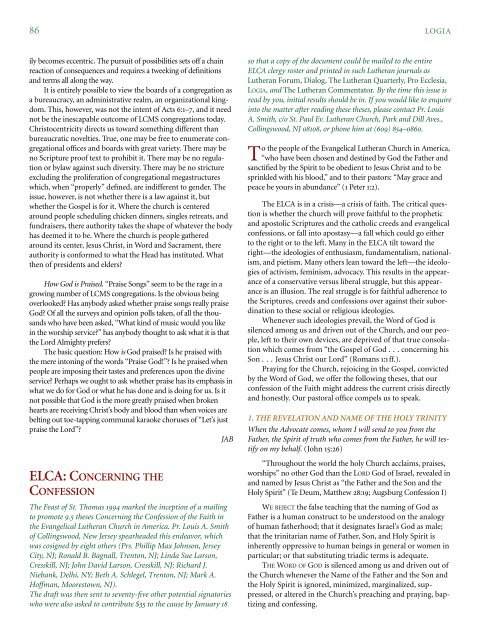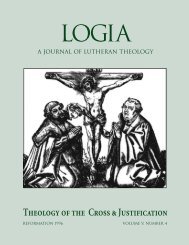04-2 Hermeneutics.pdf
04-2 Hermeneutics.pdf
04-2 Hermeneutics.pdf
- No tags were found...
You also want an ePaper? Increase the reach of your titles
YUMPU automatically turns print PDFs into web optimized ePapers that Google loves.
86 LOGIAily becomes eccentric. The pursuit of possibilities sets off a chainreaction of consequences and requires a tweeking of definitionsand terms all along the way.It is entirely possible to view the boards of a congregation asa bureaucracy, an administrative realm, an organizational kingdom.This, however, was not the intent of Acts 6:1–7, and it neednot be the inescapable outcome of LCMS congregations today.Christocentricity directs us toward something different thanbureaucratic novelties. True, one may be free to enumerate congregationaloffices and boards with great variety. There may beno Scripture proof text to prohibit it. There may be no regulationor bylaw against such diversity. There may be no strictureexcluding the proliferation of congregational megastructureswhich, when “properly” defined, are indifferent to gender. Theissue, however, is not whether there is a law against it, butwhether the Gospel is for it. Where the church is centeredaround people scheduling chicken dinners, singles retreats, andfundraisers, there authority takes the shape of whatever the bodyhas deemed it to be. Where the church is people gatheredaround its center, Jesus Christ, in Word and Sacrament, thereauthority is conformed to what the Head has instituted. Whatthen of presidents and elders?How God is Praised. “Praise Songs” seem to be the rage in agrowing number of LCMS congregations. Is the obvious beingoverlooked? Has anybody asked whether praise songs really praiseGod? Of all the surveys and opinion polls taken, of all the thousandswho have been asked, “What kind of music would you likein the worship service?” has anybody thought to ask what it is thatthe Lord Almighty prefers?The basic question: How is God praised? Is he praised withthe mere intoning of the words “Praise God!”? Is he praised whenpeople are imposing their tastes and preferences upon the divineservice? Perhaps we ought to ask whether praise has its emphasis inwhat we do for God or what he has done and is doing for us. Is itnot possible that God is the more greatly praised when brokenhearts are receiving Christ’s body and blood than when voices arebelting out toe-tapping communal karaoke choruses of “Let’s justpraise the Lord”?JABELCA: CONCERNING THECONFESSIONThe Feast of St. Thomas 1994 marked the inception of a mailingto promote 9.5 theses Concerning the Confession of the Faith inthe Evangelical Lutheran Church in America. Pr. Louis A. Smithof Collingswood, New Jersey spearheaded this endeavor, whichwas cosigned by eight others (Prs. Phillip Max Johnson, JerseyCity, NJ; Ronald B. Bagnall, Trenton, NJ; Linda Sue Larson,Cresskill, NJ; John David Larson, Cresskill, NJ; Richard J.Niebank, Delhi, NY; Beth A. Schlegel, Trenton, NJ; Mark A.Hoffman, Moorestown, NJ).The draft was then sent to seventy-five other potential signatorieswho were also asked to contribute $35 to the cause by January 18so that a copy of the document could be mailed to the entireELCA clergy roster and printed in such Lutheran journals asLutheran Forum, Dialog, The Lutheran Quarterly, Pro Ecclesia,LOGIA, and The Lutheran Commentator. By the time this issue isread by you, initial results should be in. If you would like to enquireinto the matter after reading these theses, please contact Pr. LouisA. Smith, c/o St. Paul Ev. Lutheran Church, Park and Dill Aves.,Collingswood, NJ 08108, or phone him at (609) 854–0860.To the people of the Evangelical Lutheran Church in America,“who have been chosen and destined by God the Father andsanctified by the Spirit to be obedient to Jesus Christ and to besprinkled with his blood,” and to their pastors: “May grace andpeace be yours in abundance” (1 Peter 1:2).The ELCA is in a crisis—a crisis of faith. The critical questionis whether the church will prove faithful to the propheticand apostolic Scriptures and the catholic creeds and evangelicalconfessions, or fall into apostasy—a fall which could go eitherto the right or to the left. Many in the ELCA tilt toward theright—the ideologies of enthusiasm, fundamentalism, nationalism,and pietism. Many others lean toward the left—the ideologiesof activism, feminism, advocacy. This results in the appearanceof a conservative versus liberal struggle, but this appearanceis an illusion. The real struggle is for faithful adherence tothe Scriptures, creeds and confessions over against their subordinationto these social or religious ideologies.Whenever such ideologies prevail, the Word of God issilenced among us and driven out of the Church, and our people,left to their own devices, are deprived of that true consolationwhich comes from “the Gospel of God . . . concerning hisSon ...Jesus Christ our Lord” (Romans 1:1ff.).Praying for the Church, rejoicing in the Gospel, convictedby the Word of God, we offer the following theses, that ourconfession of the Faith might address the current crisis directlyand honestly. Our pastoral office compels us to speak.1. THE REVELATION AND NAME OF THE HOLY TRINITYWhen the Advocate comes, whom I will send to you from theFather, the Spirit of truth who comes from the Father, he will testifyon my behalf. (John 15:26)“Throughout the world the holy Church acclaims, praises,worships” no other God than the LORD God of Israel, revealed inand named by Jesus Christ as “the Father and the Son and theHoly Spirit” (Te Deum, Matthew 28:19; Augsburg Confession I)WE REJECT the false teaching that the naming of God asFather is a human construct to be understood on the analogyof human fatherhood; that it designates Israel’s God as male;that the trinitarian name of Father, Son, and Holy Spirit isinherently oppressive to human beings in general or women inparticular; or that substituting triadic terms is adequate.THE WORD OF GOD is silenced among us and driven out ofthe Church whenever the Name of the Father and the Son andthe Holy Spirit is ignored, minimized, marginalized, suppressed,or altered in the Church’s preaching and praying, baptizingand confessing.
















